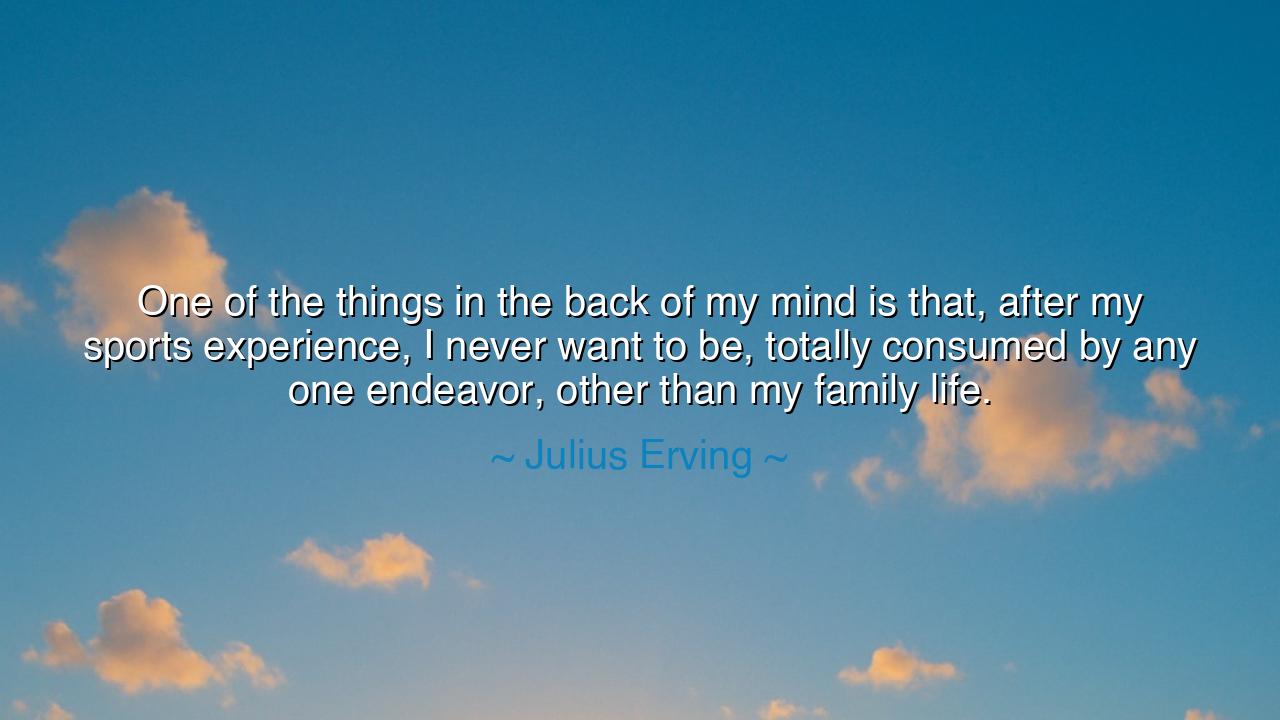
One of the things in the back of my mind is that, after my
One of the things in the back of my mind is that, after my sports experience, I never want to be, totally consumed by any one endeavor, other than my family life.






The basketball legend Julius Erving, known to the world as “Dr. J,” once reflected: “One of the things in the back of my mind is that, after my sports experience, I never want to be totally consumed by any one endeavor, other than my family life.” In these words lies a quiet wisdom, one that transcends the glare of fame and the allure of achievement. Erving reminds us that the greatest victories are not always measured in points or accolades, but in the love, attention, and care we devote to those who walk beside us in life.
This quote reveals a truth that the ancients themselves understood: that balance is the foundation of a flourishing life. The Stoics taught that no external pursuit, no matter how noble or grand, should eclipse the cultivation of virtue, the bonds of kinship, or the care of the soul. Erving, having experienced the intense consumption of his athletic career, recognized that the human heart, left untended, suffers when ambition becomes its sole master. His insight is timeless: achievement without connection leaves a hollow echo.
Consider the story of Alexander the Great, who conquered continents yet often lamented the distance from home, the absence of friendship and family. His life, though legendary, was shaped by the imbalance of single-minded pursuit. Erving’s reflection offers a corrective: the pursuit of greatness must coexist with the cultivation of what truly nourishes the soul. For him, the arena of family life is the final and enduring stage, where victories carry meaning and failures find forgiveness.
The meaning of this quote also emphasizes intentionality in living. Erving places family above all else, not as an afterthought but as a conscious priority. It is a recognition that while professional endeavors may consume hours and command passion, the relationships that endure—spouses, children, parents—are the arenas in which our truest legacies are formed. Athletic success, while celebrated publicly, pales in comparison to the quiet triumphs of daily devotion.
History provides another echo in the life of Mahatma Gandhi, who, despite leading a nation to independence, always placed spiritual practice and moral reflection at the center of his life. He understood that no political victory could replace the cultivation of love, compassion, and human connection. Like Erving, he teaches that enduring fulfillment is grounded not in fame or conquest, but in the careful tending of what truly matters.
The lesson here is clear: ambition must be tempered with perspective, and dedication to one endeavor must not eclipse the care of those we love. Life’s richness emerges not from fame or success alone, but from the daily acts of attention, kindness, and presence we offer to our family. Practical action is simple yet profound: set boundaries, invest time, listen deeply, and allow the heart to lead decisions as much as the mind. Let professional pursuits serve life, not consume it.
Thus, Julius Erving’s quote endures as guidance for all generations. It reminds us that while the pursuit of excellence may bring glory and recognition, the cultivation of family and personal relationships is the ultimate achievement. Let us learn from his reflection: to strive with passion, yes—but to love with equal or greater devotion; to excel in our endeavors, yes—but to dedicate our truest energy to the bonds that will endure long after the crowds have departed. For in the balance of ambition and love, the human soul finds its highest victory.






AAdministratorAdministrator
Welcome, honored guests. Please leave a comment, we will respond soon